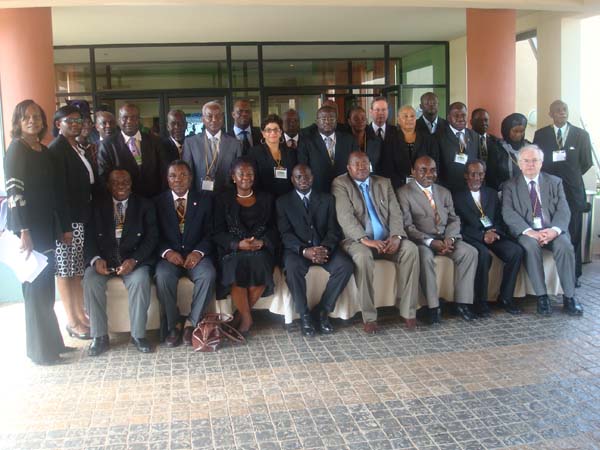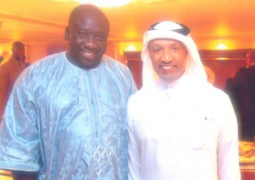
Dr. Abdullahi Shehu, the Director General of the Inter-Governmental Action Group against Money Laundering in West Africa (GIABA) has said that judicial independence is a pre-requisite to the rule of law, and a fundamental guarantee of a fair trial.
Dr. Shehu made this remarks in a statement delivered yesterday on his behalf by Baboucarr Ndiaye, Head of Finance at GIABA.
The occasion was the opening in Banjul on Monday of the 3rd seminar on economic and financial crimes for judges in English-speaking countries in West Africa, organised by GAIBA, in collaboration with the Commonwealth Secretariat.
The three-day seminar, which is currently underway at the Sheraton Hotel in Brufut, is the fifth in a series of seminars organised by GIABA for Anglophone and Francophone West African judges, who are adjudicating or are likely to adjudicate on cases of economic and financial crimes.
Dr. Shehu said "a judge must, therefore, uphold and exemplify judicial independence in both its individual and institutional aspects. A judge must exercise the judicial function independently on the basis of the judge?s assessment of the facts and in accordance with a conscientious understanding of the law, devoid of extraneous influence, inducements, pressures, threats or interference, direct or indirect, from any quarter or for any reason."
"Judges are expected to be impartial not only in their decisions, but also to the process by which the decision is made. Thus, a judge must perform his or judicial functions without favour, bias or prejudice and should ensure that his or her conduct, both in and out of court maintains and enhances the confidence of the public, the legal profession and litigants in the impartiality of the judge and of the judiciary," he added.
"Integrity is essential to the proper discharge of the judicial office. A judge must therefore ensure that his or her conduct is above reproach in the view of a reasonable observer. Justice must not merely be done, but must also be seen to be done," Dr. Shehu declared.
He emphasised that "propriety and the appearance of propriety is essential to the performance functions of a judge," noting that "as subjects of constant public scrutiny, judges must accept personal restrictions that might be viewed as burdensome by the ordinary citizen, and should do so freely and willingly.
"In particular, their conduct must be consistent with the dignity of the judicial office," he said.
"Unfortunately, the judicial system in West Africa is facing numerous challenges, including the application of obsolete legislation or lack of legislation, lack of judicial independence, undue influence, social tolerance to corruption and fear of retribution," Dr. Shehu stated.
The Chief Justice of The Gambia, Justice Emmanuel Akomaye Agim, in his keynote address, said among others, that the "lack of judicial honesty is responsible for the kind of irrational, unreasonable and frustrating decisions that have emitted from our courts in some jurisdiction on money-laundering, corruption and financial crime matters."
"Under the cover of judicial independence and banner of 'a judge can err on law of facts', we decide these cases in brazen disregard of the clear provisions of the law, the objectives of such law, and the clear facts before us.
"The impetus for this judicial misbehaviour is that judicial officers do not personally suffer some measures of discipline for such decisions. The only option is to appeal against such decisions to an appellate court.
"The consequences of such decisions are often limited to the vitiation or invalidation of the judicial process itself and not extended to the judge responsible for the brazen disregard of the law and the facts in a clearly very deliberate manner," he said.
Justice Agim added "the frequency of these decisions has brought the judiciary to disrepute and loss of public confidence in those jurisdictions.
?It is my view that there must be a response to this kind of situation. I think that our judicial accountability mechanisms should be adjusted to include personal accountability for our judicial decisions.
"There should be a mechanism for the trial of judges for deliberate disregard of the law and procedure and the facts of the case. This is the only way of ensuring that we are really independent in our decisions. There can be no judicial independence without judicial accountability or adequate judicial accountability measures to promote judicial honesty," the Chief Justice added.
The Minister of Interior, Ousman Sonko, in a statement on the occasion spoke of "the ever-glaring possibility for the undesired resurgence and saturation of illicit activities that are nurtured and funded through questionable sources in economic setup of the countries within ECOWAS sub-region has continued to present an ever-challenging environment for its member states."
History has shown, he said, that unchallenged acts of criminality, especially economic and financial crimes could potentially embody a serious threat to the peace and tranquility of countries within the ECOWAS sub-region.


